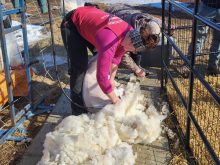If a tractor rumbles down a road in rural Alberta, will anybody hear?
That is the concern of some Alberta farm leaders following the massive victory of Ralph Klein’s Progressive Conservatives on March 12.
“I thought he would have gotten a bit more opposition. In a democracy you have got to have an opposition,” said Jack Horner, who ranches in southeastern Alberta and heads the Alberta Grazing Lease Association.
Horner sat as a federal Liberal during the Trudeau era, while his brother Hugh Horner was deputy premier and an agriculture minister under former Alberta premier Peter Lougheed.
Read Also

Charges laid after cattle theft
Saskatchewan RCMP lay two charges against a man after six cattle went missing.
As a retired parliamentarian and political observer, Horner compares this election to the Lougheed regime, which started in 1971 with a strong majority and a strong economy fueled by a booming oil industry.
The difference is that Lougheed built the Heritage Trust Fund while Klein is spending the oil money, Horner said.
“Ralph will probably run out of money after awhile,” he said from his home near Pollackville.
Horner said the government will be pressured to ensure agriculture’s rights are upheld under a new public lands act the Conservatives plan to bring in — Bill 31.
A more positive view came from Albert Wagner, a Stony Plain cattle producer and president of the Western Barley Growers Association. Representing the two largest commodities in the province, Wagner is optimistic despite the smaller opposition.
He defends the Conservatives’ record because of their support for grain transportation reform. Klein has publicly supported deregulation of commercial transportation systems.
The government has also promoted a larger value-added sector.
“That will counteract some of the negative aspects of transportation,” he said.
Further, with such a clear mandate Wagner said the government could address the issues of intensive livestock regulations, and move ahead the proposals of the Agriculture Summit.
The summit started last year and addressed everything from land-use issues, the environment and building agricultural profitability.
As for controversial issues like energy deregulation and rising costs on the farm, Wagner is optimistic.
“Deregulation will pay some dividends. I’m confident that it will straighten itself out,” he said.
The optimism and trust were echoed by PC party worker and retired farmer Mavis Schnell.
“I know we voted for the right person. Somebody had to clean house and he could do it like no one else could,” she said.
In the north, Canadian Wheat Board director Art Macklin echoed Horner’s concerns over a small opposition.
With only two New Democrats and seven Liberals, the opposition members are going to be stretched. Defending agriculture’s interests will be a challenge for farm groups, he said.
“They will have to be very clear with this government about what they want,” Macklin said.

















